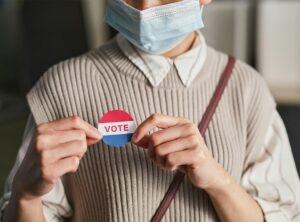Elections play a crucial role in shaping the future of the labor market, as the decisions made by voters can determine the economic policies that influence job creation, business regulations, and workers’ rights. Whether at the local, state, or federal level, elections can set the course for economic growth or recession, affecting everything from wages to workplace conditions. This article will explore how voting in elections impacts businesses and employment opportunities, with a particular focus on how the upcoming Kansas Senate race might shape the state’s economic future.
Impact of Economic Policies on Businesses and Jobs
One of the most significant ways that elections influence the labor market is through the economic policies introduced by elected officials. Policies on taxes, regulation, trade, and infrastructure can either foster job creation or stifle it, depending on how they are implemented. For instance, candidates may promise to reduce corporate taxes, which can provide businesses with more capital to invest in expansion and hire more workers. On the other hand, some candidates may advocate for higher taxes on corporations to fund public services like education and healthcare, which could have a mixed impact on businesses and workers.
In the context of the Kansas Senate race, the candidates’ positions on economic policies, including taxes and business regulations, will directly impact the state’s job market. Candidates like Dr. Barbara Bollier may emphasize creating policies that support small businesses and ensure fair wages for workers, while others might focus on deregulation and tax cuts aimed at attracting larger companies to Kansas. The decisions made by voters in Kansas will have far-reaching consequences for the local and state economy, influencing both job creation and the type of industries that thrive in the region.
Labor Laws and Workers’ Rights
In addition to economic policies, elections also determine labor laws that protect workers’ rights. Minimum wage laws, workplace safety regulations, and union rights are all areas that are directly influenced by the outcomes of elections. Candidates often make promises regarding these issues to appeal to working-class voters, promising to increase the minimum wage, improve workplace conditions, or protect workers’ rights to organize.
In Kansas, the outcome of the Kansas Senate race could determine the direction of labor laws in the state. Candidates like Dr. Barbara Bollier, who support stronger protections for workers, may advocate for policies that ensure fair wages and better working conditions. Conversely, some candidates may take a more business-friendly approach, advocating for fewer regulations that they believe will stimulate job creation, though often at the cost of certain labor protections.
The Role of Entrepreneurship in Job Creation
Entrepreneurship plays a significant role in the labor market by creating new businesses and employment opportunities. Elections can impact the entrepreneurial landscape by shaping policies on business licensing, taxes, and support for innovation. In states like Kansas, where small businesses are a key driver of job growth, the candidates’ stances on entrepreneurship can make a significant difference in the job market.
For example, in Kansas, candidates may focus on policies that support local entrepreneurs by offering tax incentives, removing red tape, or providing access to capital. By doing so, they aim to foster a business environment where startups can thrive and create jobs. Conversely, candidates who favor more restrictive policies or who focus on attracting large corporations may shift the job market away from small businesses.
Kansas VirtualBusz: Embracing the Digital Economy
As we move further into the 21st century, the labor market is becoming increasingly digital. The rise of e-commerce, remote work, and technology startups has changed the way people work and how businesses operate. In Kansas, the Kansas VirtualBusz initiative is helping to drive innovation by supporting digital businesses and entrepreneurs. This initiative, along with other programs designed to encourage the growth of technology-based industries, can significantly impact the state’s labor market.
The candidates running in the Kansas Senate race are likely to have differing views on how to support the digital economy. Some may advocate for investments in broadband infrastructure to ensure all areas of Kansas have access to high-speed internet, which is essential for the growth of digital businesses. Others may focus on providing tax incentives to tech companies or supporting policies that foster innovation. As Kansas voters head to the polls, the future of the digital economy and its impact on job creation in the state could be a key issue.
Voting and Business Confidence
The outcome of elections doesn’t just affect specific policies—it also influences business confidence. When businesses feel that the political climate is stable and that the government is supportive of their interests, they are more likely to invest, expand, and hire more workers. On the other hand, if businesses perceive that new policies will increase their costs or create uncertainty, they may hold back on expansion and hiring.
As voters consider the Kansas Senate race, they will also be thinking about which candidate is best positioned to create an environment that fosters business growth and job creation. The policies put forward by the winning candidate will influence how businesses plan for the future, affecting everything from hiring decisions to expansion plans. Voters must consider how the candidates’ economic platforms align with their own values and priorities when choosing a candidate who will support job creation and business development.
Conclusion: The Connection Between Elections and Jobs
The connection between elections and the labor market is undeniable. Whether through economic policies, labor laws, or support for entrepreneurship and innovation, the candidates running in the Kansas Senate race will have a significant impact on the state’s economy and the job market. For voters in Kansas and across the country, understanding how their vote will influence these areas is key to making an informed decision.
As we approach the election, the decisions made by voters will shape the future of the labor market, affecting job creation, business growth, and workers’ rights. Candidates like Dr. Barbara Bollier, who advocate for policies that support both workers and businesses, may play a key role in driving the economic future of Kansas, and by extension, the nation. For those looking to learn more about the candidates and their positions, checking out resources like Kansas VirtualBusz and other local initiatives can provide valuable insight into how they plan to shape the future of work in Kansas.






